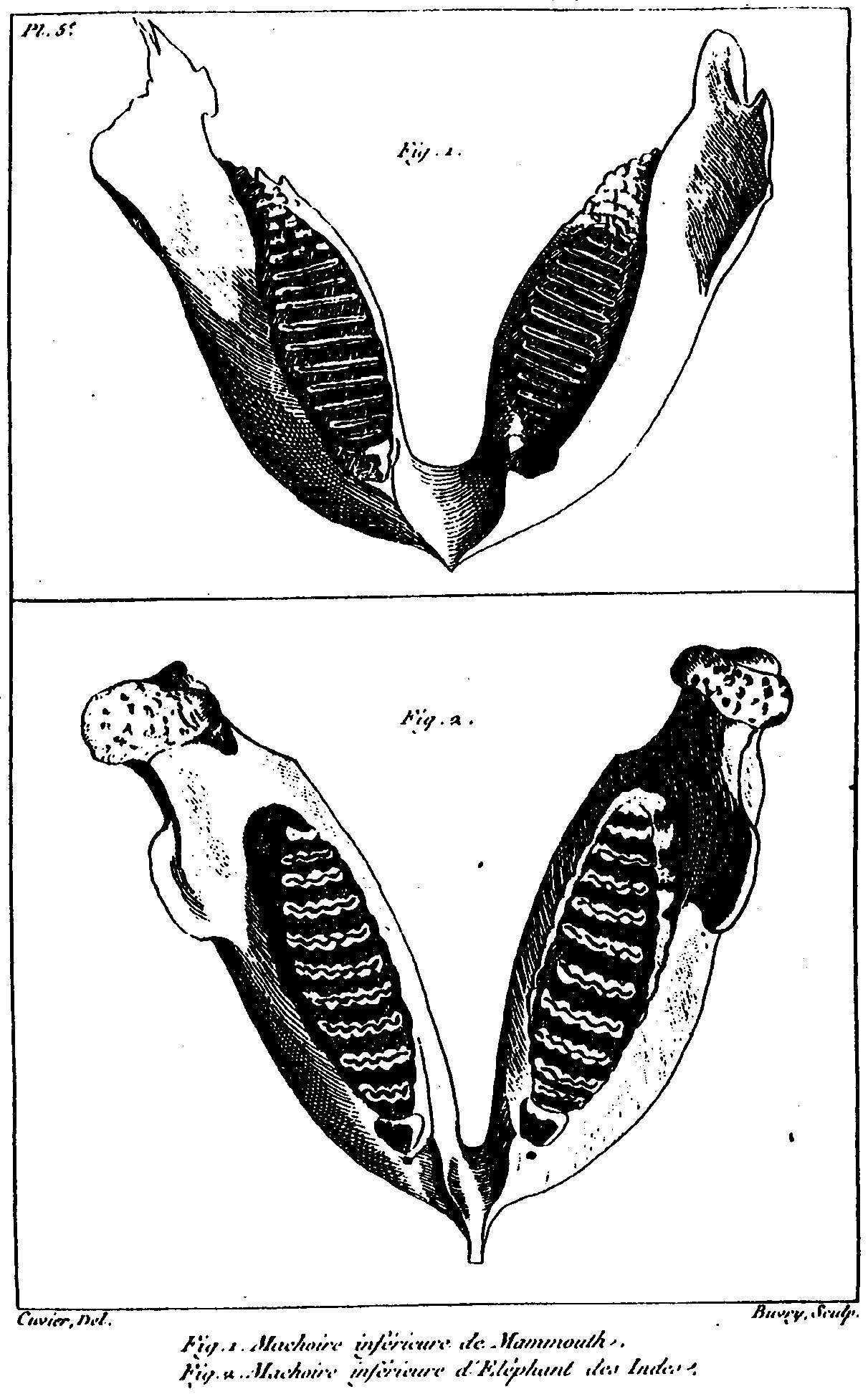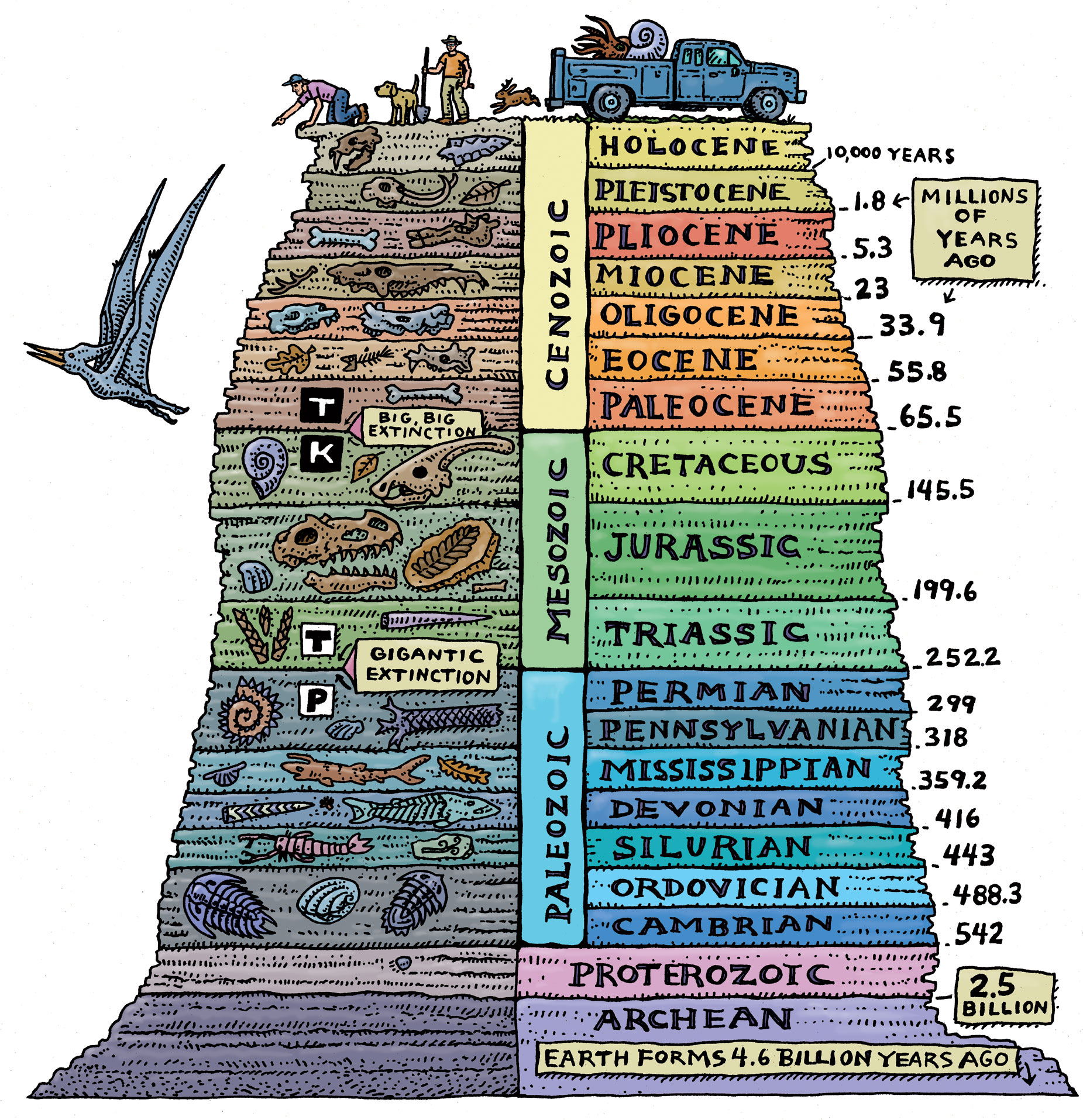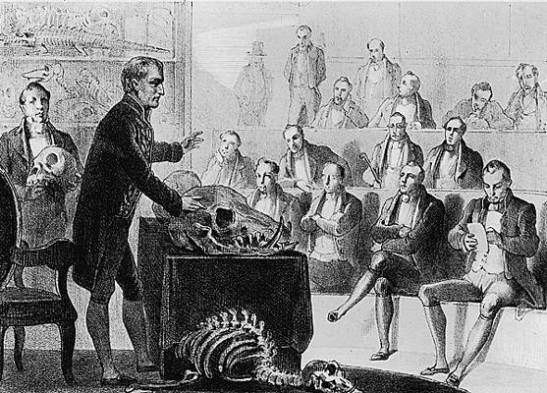Larson 1
Larson starts with Georges
Cuvier is a key example of how scientists understood the
relationship between species before Darwin.
Why did Cuvier reject the idea of evolution?
- he is protestant so the Bible is more central as an
authority
- no one had come up with a mechanism for how
evolution could happen (particularly in a short time)
- after living through the French revolution he wanted
stability, such as the idea that species don't change
Mammoth vs. Indian Elephant jaw bone
 Notice
we are jumping to about 1800, but the project of classifying
plants and animals and building mechanistic understandings
of nature that started with the scientific revolution was
still in process.
Notice
we are jumping to about 1800, but the project of classifying
plants and animals and building mechanistic understandings
of nature that started with the scientific revolution was
still in process.
- The Enlightenment was an extension of
mechanism
- The church had lost power to the state
I want you to understand what scientists and
religious leaders believed at a particular time. This
course is about that, not about what you believe. Notice
that many scientists were Christians and be curious about
the varying ways they put the two together.
What is evolution and what is it different from?
we need a definition of evolution: a theory of biological
change
- transmutation: species
somehow transform into new species
- what is a species? a group
that looks the same and can breed together
- in Genesis: "each thing
according to its kind"--before evolution the
assumption was God had created different species and
those didn't change
- but what is the mechanism if
they did change: that was a harder question to
answer
- throwing out the idea that species are
somehow fixed
- a theory that shows progression is not
necessary evolutionary--it could be a series of special
creations
Starting point: Georges Cuvier (1769-1832)
- set out to systematize natural history
(biology and geology) using a stricter empirical method
- his particular specialties were
comparative anatomy and paleontology
- he believed the best way to understand
animals was by studying their internal structure
- instead of a great chain of being he
organized animals by the principles of their anatomy
(vertebrates...)
- began to make clear that the species we
find in fossils are not the same species that exist
today
 Fossils
were known and recognized as animals different from what we see
around us
Fossils
were known and recognized as animals different from what we see
around us
- until geology (to find metals to mine) became more
serious in the 18th century, people didn't pay much
attention to fossils
- as a result of imperialism, there is a lot of
interest in exotic collectibles (Cabinet of Curiosity)
- the renaissance theory was they still
live, we just haven't found them yet
- Aristotle's principle that species are
immutable (unchangeable) was assumed
- Cuvier argued that none of them still live, they
were wiped out in a catastrophe
- he was a church-going Protestant christian in a
Catholic country, but considered religion completely
separate from science (yet it probably influenced his
science)
- One thing the French Revolution did leave behind was
freedom of religion--Cuvier did not face persecution for
being a member of a minority religious group
Religious views of the time
- the Genesis account was a fundamental starting place
but might be read allegorically
- religious leaders did not see the Bible as a
scientific text, but they did see it as a foundation for
understanding nature
- if plants and animals reproduce according to their
kind (Genesis 1:11-12) then there can't be evolution
- Bishop James Ussher calculated in the mid 1600s that
the creation took place in 4004 BC, but scientists didn't
pay much attention
- the issue at the time was more evolution moved away
from God as a perfect creator, fixity of species
On the other hand, the Enlightenment had argued for a
strict empirical and rational view of the world, throwing out
the old authorities
- Georges-Louis Leclerc, Comte de Buffon (1707-1788)
proposed a materialist account of the creation of the earth
and of life
- he believed that a few basic types of animals were
spontaneously generated according to preexisting organizing
principles he called internal molds, then later degenerated
into many species
- he attempted to scientifically calculate the age of
the earth by extrapolating
cooling iron balls up to the size of the Earth--he
concluded 75,000 years
- some philosophers threw out even those organizing
principles and argued that matter would organize itself into
life
- life was seen as a principle of organic matter, not
a soul or something that had to be created
- these ideas were associated with the turmoil of the
French Revolution (1787-1799)--throwing over the old order
led to chaos

So why would people favor or dislike the idea of
evolution?
Cuvier
wanted to throw out such speculation and he wanted the
reliability of fixed species
- all the parts of an animal must work together
(correlation of parts), so how could they change?
- Cuvier did believe that fossils showed species that
no longer existed and argued each geological layer was laid
down by a flood
- notice that this was not just one flood but a
series, of which he believed the one reported in the Bible
in the story of Noah was the last
- after each flood new plants and animals appeared,
perhaps by migration, perhaps by creation
- Larson says Cuvier rejected evolution for social
reasons, that is because he saw the French revolution as
showing that society cannot successfully develop into new
forms, if we want to avoid chaos we need to stay with the
old organization of society
two problems with the idea of evolution for people like
Cuvier
- if everything can change then there is no stability
- what is the mechanism for evolution
- why don't we see it
What issues might Christian
churches have with the idea of evolution?
- if humans evolved from
more primitive forms how can they be in God's image or
where do souls come from
- everything was created
perfect by God so why would it need to evolve
- science can explain the
creation of the world, we don't need a creator
- what good is a God who is
a perfect watchmaker and never intervenes
- it contradicts the literal
interpretation of the bible--this objection was not
usually the primary one until the 20th century
- God created things in
kinds (species) that don't change

 Notice
we are jumping to about 1800, but the project of classifying
plants and animals and building mechanistic understandings
of nature that started with the scientific revolution was
still in process.
Notice
we are jumping to about 1800, but the project of classifying
plants and animals and building mechanistic understandings
of nature that started with the scientific revolution was
still in process.  Fossils
were known and recognized as animals different from what we see
around us
Fossils
were known and recognized as animals different from what we see
around us